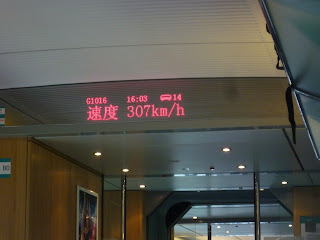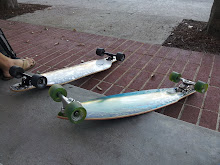I decided to take a last minute trip to Wuhan last weekend, partly to visit my family there, and partly as a self-imposed field trip for a class on globalization, culture, and capitalism that I'm taking. Note: it is a lot easier if you had a visa to China before (which I had, but they were in my other passport). So, a rainy Monday saw us at the Chinese embassy to apply for a visa. The process itself was very simple and takes about 4 business days (they'll rush it for you if you pay more), and costs $1,100HKD, more than what the website says. This is for a single-entry visa. Of course, I'm not
Bulgarian, so maybe the posted fees didn't apply to me...
The high speed rail, which connects Shenzhen to Guangzhou, then to Wuhan, travels at over 300km/hr.
Being that this is in China, land of
cutting corners to maximize profits, I was, needless to say, a little bit apprehensive about zipping along at that speed. But it was super comfortable. I got into an engaging conversation with the two women sitting on either side of me about pregnancies and "yuezi," which is a process of recuperating the woman's health and strength during the month after birth. One of the women was blaming all of her health problems on the fact that she didn't do a good "yuezi" after the birth of her first child. I refrained from telling her that this tradition is virtually unheard of in Western culture...
Oh yea, here's a picture of the station at Shenzhen. It is huge.
Upon reaching Wuhan, the crap phone my family uses when we're in China, well, crapped out. Completely. And this is when I made an inconvenient realization - this station did not have outlets just lying around for anyone to walk up and use. I ascertained that there were outlets in the passenger waiting area on the arrival deck, and trekked (and trek indeed -- do you see the Shenzhen railway station? Wuhan's railway is LARGER) there. To my dismay, there were only TWO outlets available. Two. Now think about how many people there are in China...
I finally found my cousin, who was waiting for nearly an hour at the station, wondering if I had gotten kidnapped or murdered en route to Wuhan, after I gave the woman at the information desk my best hapless puppy dog impression and she let me use her landline (at first, she suggested I walk out of the station and two blocks down to a market to find a public phone). People are much less helpful here - actually, I think people here are more helpful to their families than we are in the West, but much more dismissive of strangers. Like, the
Gini ratio for interpersonal helpfulness is very high.
For the next 36 hours or so, we were tourists. My cousin dragged along two of his friends to keep me company (and help carry my stuff, really). We visited the Hubei Provincial Museum, which had exhibits with artifacts dating to before dynastic China, more than 4,000 years ago. And these artifacts were in pristine condition.
One of the coolest exhibits was the bells found in the tomb of Marquis Yi, who was, apparently, a music lover and had a really really large coffin.
The bells were the highlight of the place.
Couple hundred pieces, all in good condition, and still playable, I think. What I found amazing is that these bells, made thousands of years ago, not only showed an understanding of the structures of music as they are still used today (halftones and diatonic scales), but were constructed in a way that displayed this understanding of music, that back then, they had the technology to be that precise - to not only make bells that played the one they wanted, but two-tone bells, wherein each bell, when struck differently, would play two different tones.
Speaking of being really modern, China's technological explosion seems to have happened during the Tang dynasty. Or somewhere like that. Then stopped sometime in the 18th century. Check out this bowl.
I'm pretty sure the date on that says early 1700's. Dude. That looks like something I have in my cupboard right now. Looks like culinary technology hasn't changed much for the Chinese in the last 300 years or so. So either that means that Chinese culture was really advanced hundreds of years ago - so advanced that we still use that technology today....or that Chinese culture today is just backwards and stuck 300 years ago. I'd be more hopeful and say it's the former.
Time is a funny thing. All of these things in museums were everyday objects of people who lived a long time ago. Who knows, maybe in 200 years, the cup I used to drink my tea this morning may be in a museum case somewhere...
One more quick note. My cousin describes development and buildings in China as a matter of "hardware" and "software." Let me give an example, and this analogy isn't parallel to our understanding of computer hardware and software. The Hubei Museum of Art is beautiful on the outside, airy and spacious. But the bathrooms are...icky. There is much in the way of showing how beautiful and grand you can make something on the outside, but the inside rots. No attention to software. All attention on the hardware. HK and Taiwan, on the other hand, are really good at the software part. The crappiest, dirtiest little storefront will have the absolutely best food in town. With a clean bathroom and ample toilet paper. It was a lack in the attention of software that caused the massive destruction of buildings in Sichuan, the cutting of corners, the rampant corruption and mining of maximum profits. I had labeled it under a different name - systems and cultures. The system can change, the buildings can be pretty, there can be a set of building codes and rules, but until the culture changes and more attention is paid to the software, everything is just going to be an empty shell.
And another quick note. Food is good in Hubei. I've been to China several times, and felt the food was always hit or miss. For breakfast one morning, we had "hot, dry noodles." In Wuhan, you don't say you "have breakfast" - you say "guo zao" or "pass the morning meal." Meaning, you eat breakfast so quickly that it simply passes you by.
But seriously, this you should savor. They even come in pre-packaged packages that you can take home to make your very own hot, dry noodles.











